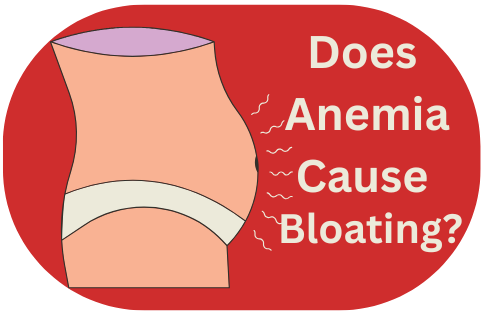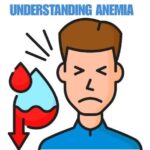When most people think of anemia, they picture fatigue, weakness, or pale skin. But many patients also report an uncomfortable symptom: bloating. This raises the question: does anemia cause bloating?
The answer isn’t straightforward. While anemia itself doesn’t directly cause bloating, the treatments, lifestyle changes, and side effects related to anemia can create digestive discomfort that feels like bloating. In this article, we’ll explore why anemia and bloating often go hand-in-hand, what science says about the link, and practical strategies for relief.
Why Anemia Can Lead to Digestive Issues
1. Iron Supplements and Bloating
Iron supplements are one of the most common treatments for anemia, particularly iron-deficiency anemia. However, they are notorious for causing digestive problems:
- Constipation
- Gas
- Abdominal pain
- A heavy or bloated feeling
This happens because iron is hard to absorb, and unabsorbed iron can irritate the gut.
2. Low Activity Levels
Anemia often causes fatigue, making it harder to stay active. Lower activity levels mean slower digestion. This can contribute to constipation and bloating.
3. Dietary Adjustments
When treating anemia, people often increase their intake of iron-rich foods (like red meat, beans, or fortified cereals). While healthy, some of these foods—particularly beans and lentils—are also high in fiber and fermentable carbohydrates that can cause gas and bloating.
4. Underlying Health Conditions
Sometimes bloating isn’t from anemia itself but from the underlying condition causing anemia. For example, gastrointestinal disorders like celiac disease, inflammatory bowel disease, or ulcers can cause both anemia and bloating.
Can Bloating Be Mistaken for Weight Gain?
Yes. Many people confuse bloating with true weight gain. Here’s the difference:
- Bloating: Caused by gas or water retention. It makes your stomach feel swollen or tight, but it’s usually temporary.
- Weight gain: Involves actual fat or muscle changes and happens gradually.
If your belly looks larger after meals or supplements but returns to normal later, it’s likely bloating rather than fat gain.
How to Reduce Bloating While Treating Anomie
Adjust Iron Supplement Timing
Take supplements with food (unless your doctor says otherwise) to ease stomach upset. Avoid coffee, tea, and dairy at the same time, since they block absorption.
Stay Hydrated
Drinking enough water helps prevent constipation, one of the main causes of bloating with iron therapy.
Choose the Right Foods
- Pair iron-rich foods with vitamin C (like citrus or peppers) for better absorption.
- Spread out high-fiber foods instead of eating them all at once.
- Limit processed foods that may worsen bloating, such as salty snacks or carbonated drinks.
👉 Learn more in our guide on iron-rich foods for better health.
Exercise Lightly
Even short walks can stimulate digestion and reduce bloating. Gentle yoga poses that twist the torso are especially helpful.
Try Smaller, Frequent Meals
Instead of three heavy meals, try five smaller ones. This helps digestion and reduces the chance of bloating.
When to See a Doctor
You should contact a healthcare provider if:
- Bloating is persistent and painful.
- You experience sudden weight loss along with anemia.
- You have blood in your stool or unexplained gastrointestinal symptoms.
These may be signs of an underlying digestive disorder that needs attention.
👉 Read Mayo Clinic’s overview of anemia causes.
FAQs About Anemia and Bloating
Does anemia itself cause bloating?
No, but treatment and lifestyle changes related to anemia often lead to bloating.
Are certain iron supplements easier on digestion?
Yes. Forms like ferrous bisglycinate or liquid iron may be gentler on the stomach than ferrous sulfate.
Can bloating make anemia worse?
Not directly. But if bloating discourages you from taking supplements or eating well, it can interfere with treatment.
Can probiotics help with anemia-related bloating?
They may. Probiotics can improve gut balance and reduce constipation, which could help ease bloating.
Key Takeaways
- Anemia doesn’t directly cause bloating, but treatment and lifestyle changes can.
- Iron supplements are the most common culprit for bloating.
- Staying hydrated, adjusting diet, and moving more can ease symptoms.
- Persistent or severe bloating should be checked by a doctor.

So, does anemia cause bloating? Not directly—but anemia’s treatments, dietary changes, and fatigue can definitely make you feel bloated. The good news is, with the right strategies, you can manage bloating while still treating your anemia effectively.
Taking care of both your digestive health and blood health will help you feel more energised, balanced, and comfortable.







